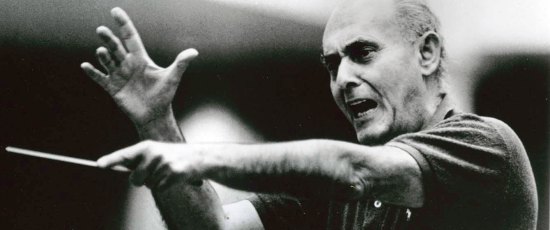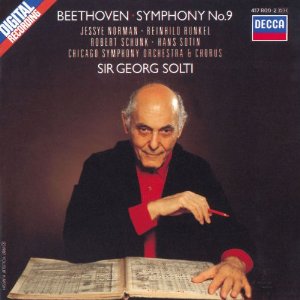Orchestra for Peace honors Solti centenary; conductor left a prodigious recording legacy
 Valery Gergiev will conduct international orchestra founded by Sir Georg Solti in memorial concert Oct. 21 at Orchestra Hall. We offer a CD sampler of the Chicago Symphony’s former music director.
Valery Gergiev will conduct international orchestra founded by Sir Georg Solti in memorial concert Oct. 21 at Orchestra Hall. We offer a CD sampler of the Chicago Symphony’s former music director.
By Lawrence B. Johnson
The birth centenary of any great contributor to human affairs gives us pause. But the Oct. 21 concert by the World Orchestra for Peace at Orchestra Hall, honoring the 100th anniversary of Sir Georg Solti’s birth, has personal relevance for me.
 At the same time Solti commenced his musical directorship of the Chicago Symphony Orchestra, in September 1969, I began my professional career as a music critic, at The Milwaukee Sentinel. There’s more to that connection than mere coincidence.
At the same time Solti commenced his musical directorship of the Chicago Symphony Orchestra, in September 1969, I began my professional career as a music critic, at The Milwaukee Sentinel. There’s more to that connection than mere coincidence.
In those days, the CSO had a long tradition of giving ten concerts each season in Milwaukee. I got to know the Solti-CSO sound very well. I already had a deeply ingrained sense of the orchestra. Growing up in Indiana, I had absorbed a goodly swath of the symphonic repertoire through the CSO’s recordings under Fritz Reiner.
And though the Chicago Symphony would end its Milwaukee connection within a few years, my Solti-CSO connection continued as I reviewed most of the Solti recordings – with Chicago and other orchestras – that streamed from Decca over the next two decades.
While Solti was a conductor of great range and sympathy, I came to associate him especially with Mahler. In selecting the dozen discs listed below as a Solti CD sampler, I included only one composer with two entries — Mahler. Solti and Chicago, the penetrating conductor and the virtuoso orchestra, lit the way to the composer’s innermost place.
When I think of Solti on the podium, I picture a crisp conducting technique that could seem almost herky-jerky. But I can also still hear the unfailing fluency, the effortlessly lyrical phrases that flowed from his musicians.
One of my first tasks as newly installed critic at The Sentinel was to interview the CSO’s formidable new music director, in person, minutes before his Milwaukee debut in his new post. He had a fearsome reputation, but I found him to be quite amenable as we sat in his dressing room. I recall only two specific moments from that interview.
 When I asked him about his interest in new music, he smiled and began: “I’m 57 years old…,” as if to excuse himself from all such accountability. His actual track record would prove somewhat otherwise.
When I asked him about his interest in new music, he smiled and began: “I’m 57 years old…,” as if to excuse himself from all such accountability. His actual track record would prove somewhat otherwise.
The other memorable moment came at the end of that interview. Again I can quote him verbatim: “You have two more minutes. Now ask me the question you really wanted to ask.”
I have no idea what question I might have been withholding. I only recall that I was amused, struck by the dry humor of this intensely intelligent man whose music-making I would come to love. Solti served as the CSO’s music director for 22 years, until 1991. He died in 1997.
The World Orchestra for Peace, which Solti founded in 1995, performs as an ad hoc ensemble drawing its musicians from orchestras large and small throughout the world. Its regular conductor, Valery Gergiev, will lead the Oct. 21 program at Orchestra Hall with guest artists including soprano Angela Gheorghiu and bass René Pape. Lady Valerie Solti, the conductor’s widow, will serve as hostess.
Featured on the program will be Bartok’s Concerto for Orchestra, Strauss’ “Don Juan,” the Adagietto from Mahler’s Fifth Symphony and music of Mozart and Verdi.
Here’s my sampler of Solti on CD. All recordings are with the Chicago Symphony Orchestra unless otherwise noted. The list is chronological, with recording dates.
 Mahler: Symphony No. 5 in C-sharp minor (1970). The first recording Solti made with the CSO remains illustrative on many levels. This impassioned performance instantly affirmed Solti’s rapport with Mahler’s musical world-view, and the orchestra’s precise yet expansive playing bespoke a very special bond with its new maestro that would resonate in many wonderful recordings over the next two decades.
Mahler: Symphony No. 5 in C-sharp minor (1970). The first recording Solti made with the CSO remains illustrative on many levels. This impassioned performance instantly affirmed Solti’s rapport with Mahler’s musical world-view, and the orchestra’s precise yet expansive playing bespoke a very special bond with its new maestro that would resonate in many wonderful recordings over the next two decades. - Mahler: “Das Lied von der Erde” (1972), with Yvonne Minton, mezzo-soprano; René Kollo, tenor. Solti proved to be one of Mahler’s most zealous and persuasive advocates. This recording of what could be argued as Mahler’s greatest work fairly bursts with life even as it ends with the most profound foreshadowing of death. The Solti-Minton-CSO journey through the crowning “Abschied” never loses its disarming beauty.
- Brahms: Symphony No. 4 in E minor (1978). Solti’s mercurial, dramatically charged account of the passacaglia that caps the Fourth Symphony captures in microcosm the confluence of classical structure and Romantic ardor that suffused Brahms’ music to the last. Decca framed the CSO’s gorgeous playing in sound at once detailed and spacious.
- Schubert: Symphony No. 9 in C major (1981), with the Vienna Philharmonic. Also: Wagner: “Siegfried Idyll” (1965). Here, with Vienna Philharmonic, is a Schubert “Great C major” whose singular eloquence, songfulness and light reflect what was so familiar in the concert hall. To listen attentively to this recording is to appreciate Solti’s sensitivity to rhythmic nuance, interior voicing and the lyrical line that binds Schubert the songsmith to Schubert the symphonist.
 Bruckner: Symphony No. 4 in E-flat (“Romantic”) (1981). This splendid recording of the Fourth Symphony – a towering edifice of grandeur, radiance and solemnity – typifies Solti’s quite personal and distinctly heroic way with Bruckner. In just that way, the CSO’s performance is refined, concentrated, blazing.
Bruckner: Symphony No. 4 in E-flat (“Romantic”) (1981). This splendid recording of the Fourth Symphony – a towering edifice of grandeur, radiance and solemnity – typifies Solti’s quite personal and distinctly heroic way with Bruckner. In just that way, the CSO’s performance is refined, concentrated, blazing.- Bartók: Concerto for Orchestra and Dance Suite (1981), Music for Strings, Percussion and Celesta (1989). It’s impossible to omit the Concerto for Orchestra from any sampler of Solti on record. The Hungarian-born maestro, who studied piano with the composer, championed his music throughout this life. This witty, virtuosic account is a technical thriller and ripping fun.
- Dvořák: Symphony No. 9 in E minor (“From the New World”) (1983). If there is a hard-ridden war horse in the symphonic repertoire, this is it. But the “New World” Symphony is also a magnificent and touching expression of that tradition. In this recording, Solti comes to the work with a conviction and sympathy that takes us back to the music’s spiritual genesis. It’s a lovely performance, buoyant and potent.
 Handel: “Messiah” (1984), with the Chicago Symphony Chorus. Kiri Te Kanawa, soprano; Anne Gjevang, contralto; Keith Lewis, tenor; Gwynne Howell, bass. Who woulda thunk it? In the age of best-guess Baroque performance practice by little bands playing gut-strung instruments, here’s this conductor of Bruckner-Mahler fame leading a “Messiah” of consummate elegance and brio, and with a keen sense of style. The performance by Margaret Hillis’ choristers is not to be surpassed and the CSO absolutely sparkles.
Handel: “Messiah” (1984), with the Chicago Symphony Chorus. Kiri Te Kanawa, soprano; Anne Gjevang, contralto; Keith Lewis, tenor; Gwynne Howell, bass. Who woulda thunk it? In the age of best-guess Baroque performance practice by little bands playing gut-strung instruments, here’s this conductor of Bruckner-Mahler fame leading a “Messiah” of consummate elegance and brio, and with a keen sense of style. The performance by Margaret Hillis’ choristers is not to be surpassed and the CSO absolutely sparkles.- Haydn: Symphony No. 95 in C minor and Symphony No. 104 in D (“London”), with the London Philharmonic Orchestra (1985). Solti didn’t record a great deal of Haydn, but this affectionate and animated pairing with the London Philharmonic affords another telling perspective on the conductor’s embracing art. As a purveyor of subtle wit, Haydn was unexcelled. Here’s evidence that the same might be said of Solti.
 Beethoven: Symphony No. 9 in D minor (1986), with the Chicago Symphony Chorus. Jessye Norman, soprano; Reinhild Runkel contralto; Robert Schunk, tenor; Hans Sotin, bass. The only question was which Beethoven symphony to include. The Ninth is my choice for Solti’s propulsive, unifying rhythms and crystalline voicing in the opening movement and the vocal splendors – choral and solo alike – of the finale. Add to this the hair-raising power Solti brings to the scherzo and an ethereal adagio, and you have one of the finest recordings of the Ninth ever produced.
Beethoven: Symphony No. 9 in D minor (1986), with the Chicago Symphony Chorus. Jessye Norman, soprano; Reinhild Runkel contralto; Robert Schunk, tenor; Hans Sotin, bass. The only question was which Beethoven symphony to include. The Ninth is my choice for Solti’s propulsive, unifying rhythms and crystalline voicing in the opening movement and the vocal splendors – choral and solo alike – of the finale. Add to this the hair-raising power Solti brings to the scherzo and an ethereal adagio, and you have one of the finest recordings of the Ninth ever produced.- Tchaikovsky: Symphony No. 5 in E minor (1987) and “Swan Lake” Suite (1988). In a sense, this opulent Tchaikovsky Fifth points up the range of Solti’s musical sensibility no less than the Haydn symphonies cited above. This is a plausibly Russian approach to a composer whose idea of symphonic structure bore faint kinship to the Austro-German tradition. Here’s the Chicago Symphony under full Romantic sail, and at the wheel a master of all symphonic seas.
- Stravinsky: “Le Sacre du Printemps” and Shostakovich: Symphony No. 1, with the Royal Concertgebouw Orchestra (1991). What a screamer of a combo this is, Stravinsky’s mad mash-up of primordial rhythms and the young Shostakovich’s piquant proclamation of the symphony for a new age. Solti dispatches both with equal parts of élan and panache. If it wasn’t to be with the stalwart CSO, it might as well be the formidable band of the Concertgebouw.
- Solti at 100: Timeline and biography at CSO.org
- Solti’s last concert with the CSO was his 999th: Read about it in the CSO Archives
- More on Solti in the CSO Archives: Check out these blog entries
- Decca Records celebrates Solti’s centenary with CD sets, streams and downloads: Details at deccaclassics.com
- World Orchestra for Peace concert details and ticket info: Go to CSO.org
Tags: Chicago Symphony Orchestra, Decca Records, Lady Valerie Solti, London Philharmonic Orchestra, Royal Amsterdam Concertgebouw Orchestra, Sir Georg Solti, Valery Gergiev, Vienna Philharmonic Orchestra, World Orchestra for Peace











